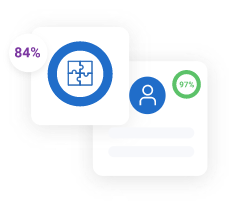- Application
- Information
Apply through Brive
We are official partners! Complete your application for free and earn benefits!
Free review on your application |
1:1 counselling by certified consultants |
Higher acceptance rate on your top choices |
Duration
2 Years, 6 Months
Language
English
90% of students are employed within 6 months
Affordable tuition fees with flexible payment options.
Schedule a free callProgram Description
Bioinformatics is a new and spectacular field which uses methods from informatics to store and process molecular biological information (DNA, proteins, functions). In bioinformatics, molecular biology is combined with informatics and programming. Bioinformatics scientists are capable of retrieving the necessary information from databases and using these to make predictions. As a bioinformatician you will look for application possibilities of informatics within biological/biomedical laboratories.
As the training progresses, you become more and more familiar with the processing of complex biological data, like the analysis of next generation sequencing data (NGS data) or the application of machine learning techniques and you are able to apply these within a professional framework.
During the program there is a special emphasis on the application of open source tools, both in a Windows and in a Linux environment. During the traineeship (without a bachelor’s thesis) a fourth role is addressed, that of the new young professional, in which the more generic competencies of a bachelor's training (such as working in team, clear communication, …) are pursued.
The bioinformatics course units provide an overview of tools and techniques for biological data processing and (statistical) analysis. You learn to process next-generation sequencing data, to analyze and compare molecular sequences in the context of evolution, to model the structures of biological macromolecules, and to analyze biological processes and pathways on the systems level.
Howest University of Applied Sciences provides the possibility to take the exams from home.
Tuition fees for international students are €3,558/year.
As soon as they reach the 1st year of studies, European students can ask for a government fund based on their income.
As the training progresses, you become more and more familiar with the processing of complex biological data, like the analysis of next generation sequencing data (NGS data) or the application of machine learning techniques and you are able to apply these within a professional framework.
During the program there is a special emphasis on the application of open source tools, both in a Windows and in a Linux environment. During the traineeship (without a bachelor’s thesis) a fourth role is addressed, that of the new young professional, in which the more generic competencies of a bachelor's training (such as working in team, clear communication, …) are pursued.
The bioinformatics course units provide an overview of tools and techniques for biological data processing and (statistical) analysis. You learn to process next-generation sequencing data, to analyze and compare molecular sequences in the context of evolution, to model the structures of biological macromolecules, and to analyze biological processes and pathways on the systems level.
Howest University of Applied Sciences provides the possibility to take the exams from home.
Tuition fees for international students are €3,558/year.
As soon as they reach the 1st year of studies, European students can ask for a government fund based on their income.
Entry Requirements

Are you eligible to apply?
Sign up, check the entry requirements, and find out your compatibility with the program.
Work Opportunities after Graduation
A lot of students get a job offer while doing the internship. Within 6 months 90% of students are employed.
More
Curriculum
Jobs - Careers
- Informatics Scientist
- Bioinformatics Scientist
More
Outdated Content
The content has not been updated in the last 6 months
Need help applying to this program?
Schedule a free 20-minute counseling session today!
Similar programs |